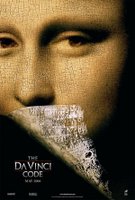 The Da Vinci Code (2006)
The Da Vinci Code (2006)
 Yes. I'm back again after a hiatus of two and a half months. Contrary to what many believed that I had altogether stopped watching movies because of extreme frustration over the Oscars, I'm here--alive and well. Truth is, there had never been good movies after the Academy Awards season, except for one or two, so I temporarily stopped writing. But the gaga over MI3 and Da Vinci had me rushing back to my keyboard again.
Yes. I'm back again after a hiatus of two and a half months. Contrary to what many believed that I had altogether stopped watching movies because of extreme frustration over the Oscars, I'm here--alive and well. Truth is, there had never been good movies after the Academy Awards season, except for one or two, so I temporarily stopped writing. But the gaga over MI3 and Da Vinci had me rushing back to my keyboard again.For starters, here's my review of the "most highly-anticipated film of the year."
Well, well, well. The first question that might be of interest is: why was Ron Howard picked to direct this movie? He's a good actor and director no doubt, having starred in and made unforgettable movies like The Cocoon, Far and Away, Apollo 13 and A Beautiful Mind. But to create a suspense, action-filled mystery-thriller, one would expect that producers would bank on the credibility of the likes of John Woo, Brian Singer and others of the same league.
What resulted in the adaptation of Dan Brown's novel was, to quote a friend and fellow critic, a "National Geographic special on slow-mo." The movie relied heavily on the popularity (some say notoriety) of the book and forgot that the two media are of different genre, and therefore what works in the other might, and in this case, did not work on the other (the movie).
After Prof. Langdon (Hanks) and Sophie (Tautou) reached the Chateau Villette, where they were given a crash course on biblical hermenuetics, apocryphal writings and ecclessiology and the occult, and where the "biggest hoax in the history of mankind" was revealed, it was down, down hill all the way through the end. The movie kept on topping the revealed secret with surprising twists (which were never really surprising, anyway) to up the ante but it miserably failed to do so.
If the ho-hum reaction of the audience is enough an indicator of the interest of the audience (or its lack of), then Cannes critics have the reason to raise their eyebrows. At the end of the movie, one flabbergasted member of the audience exclaimed, "That's it?"
Dan Brown fans, consider yourselves warned.
I wonder what Mona Lisa was smiling about?


 Previous Posts
Previous Posts

0 Comments:
Post a Comment
<< Home